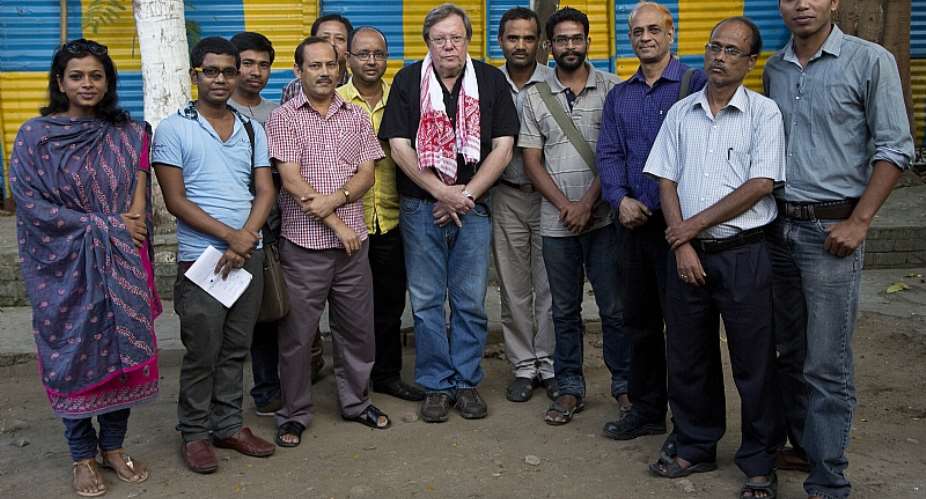Guwahati: Unlike the hype created by some western media outlets on Burma’s forthcoming general elections, the new government there will not be led by pro-democracy icon Daw Aung San Suu Kyi. Rather the present President Then Sein is likely to get reappointed as the head of the State & government after the 8 November 2015 polls, feels Bertil Lintner, an eminent journalist and expert on Burma (Myanmar) affairs.
Attending an interactive session with media persons at Guwahati Press Club in northeast India recently, the Swedish journalist also clarified that the ruling Union Solidarity and Development Party (USDP) would regain power even if Suu Kyi led opposition party National League for Democracy (NLD) sweeps the polls, because 25% of the Parliamentary seats of Burma were already reserved for military personnel and the USDP has been fully backed by the Army.
He also added that Suu Kyi has been prevented to attain the Presidency as she married to a foreign national and her two sons live in outside Burma. Shockingly, any amendment to the 2008 constitution needs to be supported by more than 75 percent Parliamentarians, which is unlikely unless there emerges a miraculous crack in the Burmese military clout in support of Nobel laureate Suu Kyi.
The NLD won a landslide victory in 1990 general elections, which were largely free & fair, but the brutal and isolationist military regime did not recognize the voters’ mandate and refused to hand over power to the elected representatives. The head of the regime Senior General Than Shwe, who grew enmity towards Suu Kyi, even ordered brutal crack downs over NLD activists. Subsequently Suu Kyi was also put under house arrest for years as a political prisoner.
After 15 years of house arrest, Suu Kyi was released, but her party was not allowed to participate in the last polls for lower house of Myanmar Parliament that took place in 2010. The military backed USDP swept the polls. The present President also came to the scene in place of Than Shwe and the reform process started gaining momentum.
Lastly the NLD participated in 2012 Parliamentary by-elections, where it won 43 seats (including Suu Kyi) out of 45 contested constituencies.
One more aspect, which should not be ignored here that, in 1990 Suu Kyi was the most popular personality in Burma, as she stood firmly against the military people and was also loved, respected and trusted by all community and ethnic groups of the country. But the scenario has changed to many extend today as Suu Kyi becomes a part of the semi-civilian regime at NayPieTaw, Myanmar’s new capital.
Currently a writer with Asia Pacific Media Services, Lintner earlier worked with Far Eastern Economic Review and he has authored several books on Myanmar including 'Burma in Revolt: Opium and Insurgency Since 1948', 'Land of Jade: A Journey from India through Northern Burma to China', 'The Kachin: Lords of Burma's Northern Frontier', 'Outrage: Burma's Struggle for Democracy' etc.
Lintner is one of many blacklisted journalists, who were earlier prevented in entering Burma arguing that their reports on Burma were groundless and based on wishful thinking. Lately he returned to report about Burma as the government relaxed many relevant rules. Presently based in Chiang Mai of Thailand, Lintner’s wife Hseng Noung hails from Shan State of Burma. They have daughter who lives now in Sweden.
Lintner also opined that the result of the Myanmar polls would have little impact on the activities of northeast Indian militants inside Burma, where they were hiding for years with inherent supports from China and creating troubles in northeast India. According to the scholar, the Burmese Army would never disturb the foreign armed militants in their soil, as they have less resource and more precisely they are not interested on them with little political will.







 We’re disappointed over gov’t’s lacklustre attitude to negotiations of our condi...
We’re disappointed over gov’t’s lacklustre attitude to negotiations of our condi...
 No more Buffer Stock as Mahama promises to decentralise SHS food supply
No more Buffer Stock as Mahama promises to decentralise SHS food supply
 NSS urges President Akufo-Addo to sign National Service Bill into law
NSS urges President Akufo-Addo to sign National Service Bill into law
 You're lying, your 7-11pm dumsor attributed to overloaded transformers is false ...
You're lying, your 7-11pm dumsor attributed to overloaded transformers is false ...
 Consult Council of State on anti-gay bill – Mahama advises Akufo-Addo
Consult Council of State on anti-gay bill – Mahama advises Akufo-Addo
 Transport Ministry has no power to determine fares – COPEC
Transport Ministry has no power to determine fares – COPEC
 Brace yourselves for more economic hardship – Prof Adei to Ghanaians
Brace yourselves for more economic hardship – Prof Adei to Ghanaians
 Any government depending on IMF is likely to fail – Grand Coalition
Any government depending on IMF is likely to fail – Grand Coalition
 Ghana risks losing premium cocoa position due to galamsey – COCOBOD laments
Ghana risks losing premium cocoa position due to galamsey – COCOBOD laments
 Akufo-Addo launches NSS policy document to tackle under-utilisation of service p...
Akufo-Addo launches NSS policy document to tackle under-utilisation of service p...
